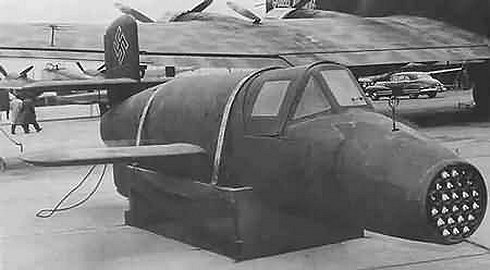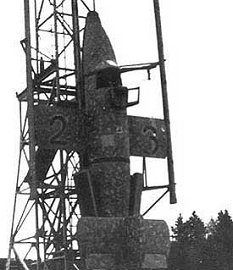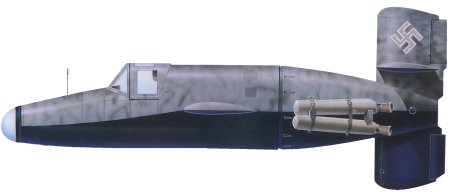
BA 349 Natter
Four companies submitted designs to meet the German air ministry's demand for a small point interceptor and Bachem's Ba 349 was eventually chosen for evaluation. This was mainly due to the intervention of SS leader Heinrich Himmler, who was looking for ways to increase his influence in the armed forces.
With Germany's industry suffering from Allied raids it was necessary for the Natter to be built from wood and be of simple construction, allowing rapid and economical production.
The final Ba 349 design was essentially that of a manned surface to air missile. Launched from a vertical rail, the Natter would continue to climb vertically, controlled by an autopilot, using its main rocket engine and additional power from rocket boosters. As the aircraft reached a bomber formation, the pilot would resume control and make a firing pass using unguided rockets. The aircraft would then descend to an altitude of 1400 m (4,600 ft) and the nose section would separate from the fuselage. The pilot would release himself and descend, along with the fuselage, by parachute.
Of 36 airframes built, only 10 reached operational status. These never saw combat, however, but were blown up as American land forces approached their base.
By the Spring of 1944 the mounting pressure placed on the Luftwaffe's fighters force by the continuous stream of Allied bombers had reached a critical point. Germany could not survive unless the effect of these raids was rapidly reduced. A radical solution was sought, and the German air ministry issued a request for a machine which combined the capabilities of an interceptor aircraft and a missile. Bachem proposed the rocket powered Ba 349 Natter (Adder).
 |
 |
| The Ba 349's primary weapons were the 24 Hs 217 rockets housed in the nose. |
Natter blasted off from a 6 m (20 ft) vertical gantry. Three channelled rails guided the wings and the lower fin. |
|
BA 349 Natter (Technical Specification) |
| Role |
Single seat semi expendable interceptor |
| Manufacturer |
Bachem |
| Maximum Speed |
998 kmh (619 mph) |
| Initial climb rate |
11,400 m/min (36,415 f.p.m.) |
| Combat radius |
40 km (25 miles) at 12,000m (39,400 ft) |
Weight
Maximum Takeoff |
2,200 kg (4,850 lbs) |
Dimensions
Wingspan
Length
Wing Area |
3.60 meters (11 ft, 10 in)
6.10 meters (20 ft)
2.75 square meters (30 sq ft) |
| Engines |
One Walter HWK 509C-1 bi fuel rocket motor providing 19.62-kN (3,748 lbs) thrust
Four Schmidding 109-533 solid fuel rockets each providing 4.9-kN (2,640 lbs) thrust |
| Armament |
24X73 mm (2.9 in) Hs 217 Fohn rockets |
Photo Gallery
Click here to submit your photo
| Have A Passion For Aircraft? |
Subscribe to our 14 series FREE newsletter
delivered weekly on World War 2 Aircraft factfile... |
| NB:- We hate spam as much as you do, so your email address will NEVER be shared with or sold to anyone else. That's a Guarantee. |
|
|





